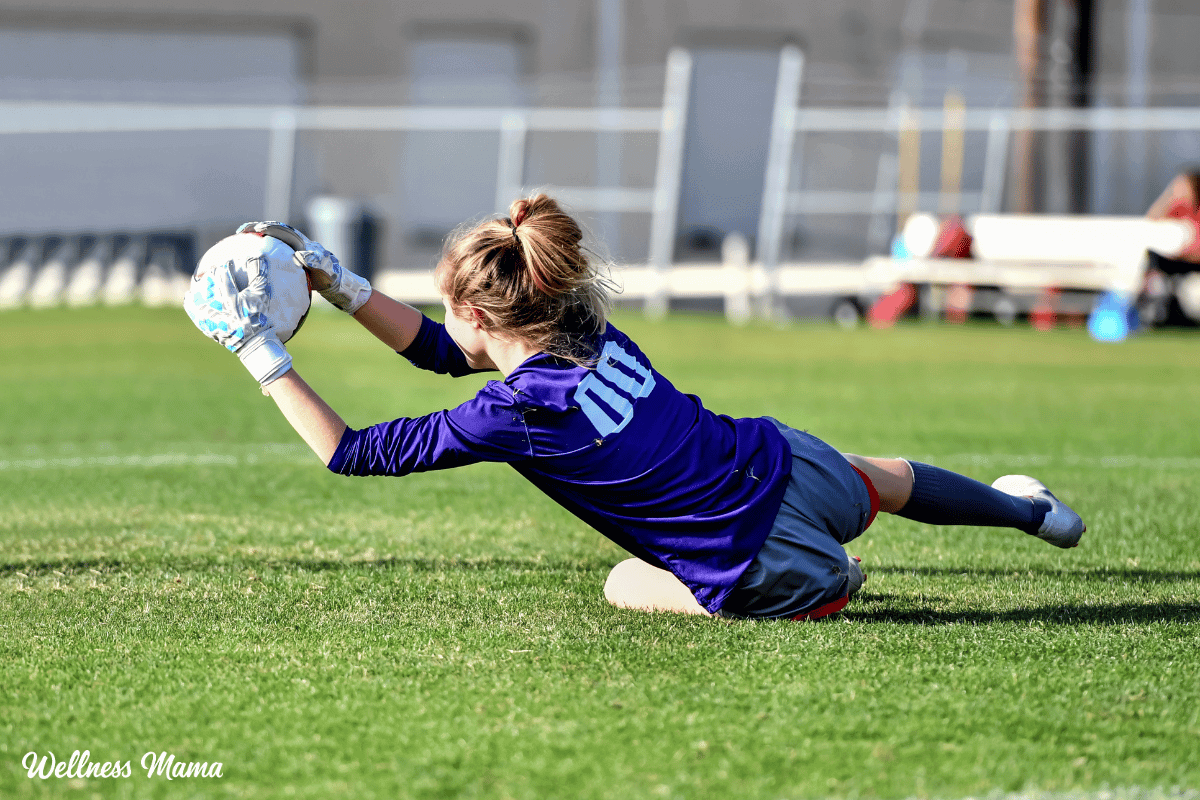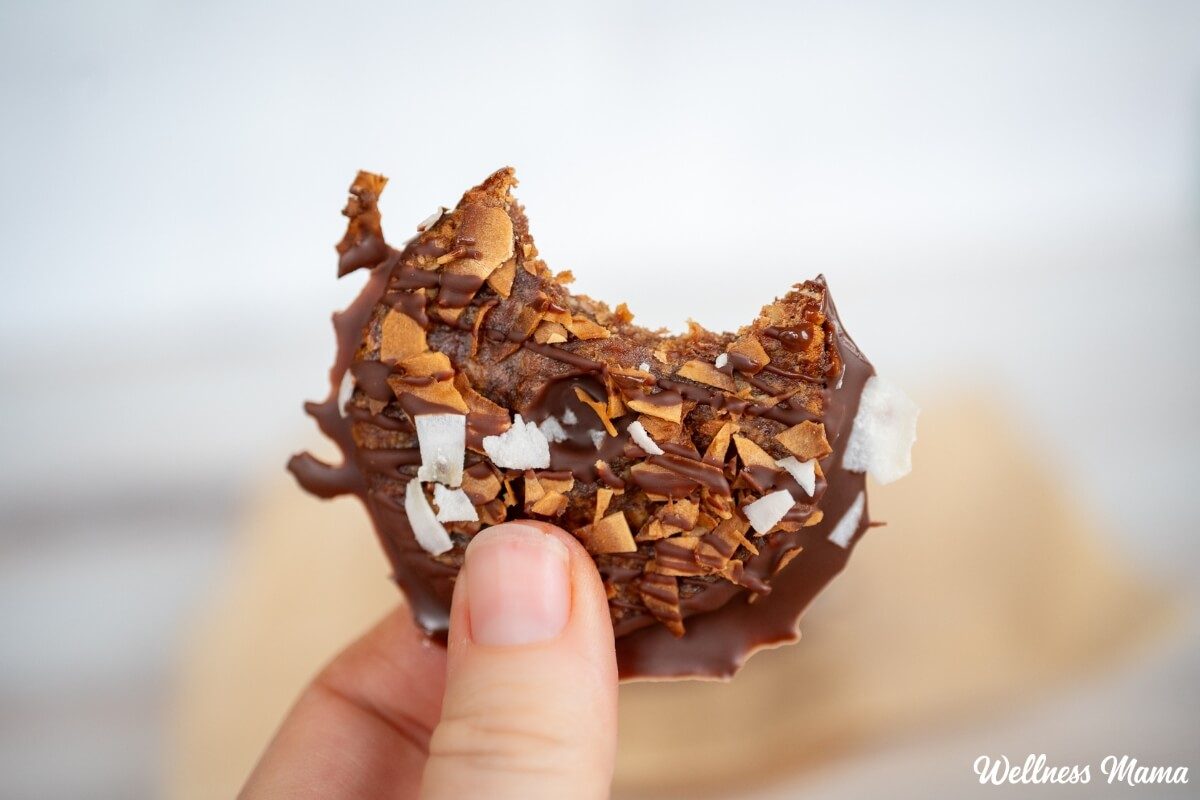
The teen years can feel like a whirlwind. Bodies are changing daily, hormones are in constant flux, and no snack in the pantry is safe. For teen athletes, that whirlwind becomes even more intense. Practices, games, tournaments, and strength training sessions pile on top of schoolwork and social life.
So how can we as parents best support our kids during this stage? And of course, without putting too much pressure on them or feeling burnt out ourselves. As a mom of several teens (and counting!) I’ve learned that they don’t always want to listen to mom. They’re learning independence, an important skill, but they still need some guidance and direction from parents.
What Teens Need
I’ve found what teens need most during this stage is balance. Their growing bodies and developing brains require more than just calories. They need targeted nutrition, consistent recovery habits, and the tools to take ownership of their health. Drawing from both research and real-life experience raising athletic kids and as a high school track coach, here are some practical strategies.
Even if your kids aren’t in competitive sports, much of this still applies to teens in general.
Why Teen Athletes Are Different
It’s tempting to think that teens can follow the same sports nutrition and training advice as adults, just in smaller doses. But adolescence is a unique window of development. Bones are still lengthening, muscles are forming rapidly, and the brain is fine-tuning everything from decision-making to stress response. Hormones like testosterone, estrogen, and growth hormone surge during this period. This influences energy needs, sleep cycles, and even mood (as I’m sure you’ve noticed!).
On top of that, the typical teenage schedule often works against what their bodies actually need. Their circadian rhythms naturally shift later, yet school start times keep them waking up early. Add in evening practices or weekend competitions, and it’s easy for teens to fall into a pattern of chronic sleep deprivation.
Meanwhile, their nutrient requirements are higher than ever. Not just calories, but also specific proteins, minerals, and healthy fats that fuel growth and repair. It’s easy for even well-meaning families to end up with nutritional gaps.
Fueling for Growth and Performance
If I could only say one thing about teen athlete’s nutrition it would be how important protein is. For active teenagers, I like to aim for about one gram of protein per pound of body weight each day. This can make a tremendous difference in muscle development, recovery, and even mood stability.
That might sound like a lot, but when you consider the demands of growth and training, it makes sense. Eggs, chicken, beef, fish, and dairy are all excellent sources, and protein powders or shakes can fill in the gaps when schedules get tight.
Breakfast sets the tone for the entire day. Teens who start with a protein-rich meal are less likely to crash mid-morning or reach for ultra-processed foods later on. Something as simple as scrambled eggs, a smoothie with Greek yogurt, or overnight oats with a boost of protein powder. From there, including balanced meals with real food proteins, colorful veggies, healthy fats, and complex carbs helps them with energy and recovery.
More Complete Nutrition
And don’t forget about the micronutrients and minerals! Electrolytes like sodium, potassium, and magnesium keep muscles functioning properly. They also prevent cramping, especially in hot weather or during long practices. Vitamin D supports both bone health and hormone balance, yet many teens don’t get enough.
Omega-3 fats, choline, and collagen-rich foods like slow-cooked meats or bone broth can help with brain health, skin, and joint support. These aren’t just “extras.” They’re the building blocks teenagers need, especially athletes.
Here are some healthy options to fuel teen athletes
The Role of Recovery
We often think of training as the main event, but the real magic happens during recovery. This is when muscles repair, hormones regulate, and the nervous system recalibrates. For teenagers, recovery is doubly important because their bodies are still developing.
Sleep is the most powerful recovery tool available. Most teens need nine to ten hours of quality sleep, but few get close to that. Encouraging a consistent bedtime, reducing screen use at night, and creating a dark, cool sleeping environment can make a big difference. Here are some resources for healthier sleep and recovery:
Other recovery strategies, like mobility work, stretching, or even light breathwork, support joint health and stress management. Some teens may enjoy experimenting with things like cold plunges or sauna sessions. However, don’t overlook the basics, like regular rest days, training variation, and simple downtime. Even encouraging more barefoot time can strengthen the feet and ankles, reducing injury risk.
Smart Supplementation
Supplements are never a replacement for whole food, but they can fill in important gaps for busy or highly active teens. Creatine is one that comes up often in the athletic world. You might think of body builders, but the research shows it’s a great option for muscle and brain health for many people. Magnesium (as mentioned earlier) is also really helpful since the majority of us, including teens, are deficient.
Vitamin D is worth monitoring, especially for kids who spend much of their day indoors. Pairing it with vitamin K2 helps our bodies properly use calcium and supports bone health. Of course, any time they can get outside in the sun the better! Other minerals like zinc and selenium also play a role in hormone regulation and immune function, especially during puberty.
Here are my favorite supplement resources that I use and recommend:
Raising Adults
One of the most important lessons I’ve learned in raising athletes is that lasting change happens when teens take ownership of their health. Many people are shocked when I tell them I let my kids eat whatever they want! Ultimately we’re not raising kids, we’re raising adults who will make their own life decisions.
Instead of dictating what they have to eat or supplement with, I’ve found it works best to lead by example. As the old saying goes, more is caught than taught. I also share the “why” behind things. When they can see how protein affects soreness, or how sleep influences their reaction times, they’re more motivated to make those choices themselves.
Creating an environment that makes good decisions easy is another step. As their mom my job is to provide nutrient-dense snacks and meals, it’s up to them to eat them (or not). We also keep certain supplements readily available, like electrolytes on the counter, and digestive enzymes on the dinner table.
Health Tracking And Mental Support
Teens also benefit from tracking their own progress. Whether that’s noticing how they feel after a week of better sleep, or seeing how protein affects their strength in the gym. Small experiments like these and showing them how to be mindful help them see the connection between their habits and performance. Something like an Oura Ring to track health metrics can be really useful and help put them in the driver’s seat.
Mental health and social support are also important. Training stress is one thing, but emotional stress from friendships, academics, or family dynamics can take just as much of a toll on recovery. Making space for teens to feel heard and supported goes a long way in their overall well-being.
Putting the Pieces Together
So what does this actually look like in real life? A typical day might start with a protein-rich breakfast. Maybe eggs with avocado and fruit, or a brain power protein smoothie. During the school day, having water with electrolytes and snacks like nuts, beef jerky, or a protein bar keeps energy steady.
After practice, a balanced dinner with protein, vegetables, and some healthy carbs helps replenish nutrient stores. Also, getting outside as much as possible for circadian alignment, vitamin D synthesis, and other health benefits.
In the evenings, the focus shifts to recovery. A little stretching or mobility work, some downtime with the family, and a screen-free wind-down routine. These make it easier to get the 8-10 hours of sleep they need. Physical and mental rest is also important to prevent burnout and injuries. Supplements can then support the base of whole, nutrient-dense foods.
Final Thoughts on Supporting Teen Athletes
Supporting a teen athlete isn’t about micromanaging their schedule or filling their plate with perfect meals. It’s about creating a foundation where their body has what it needs to grow, adapt, and thrive.
Our job as parents and mentors is to provide the tools, the environment, and the encouragement. Their job is to learn, experiment, and take ownership of their own health journey. The idea is to set them up with the tools and habits they need for success into adulthood. We can’t make their choices for them, but we can help them thrive both on and off the playing field!
Do you have any teen athletes in your home? What are some ways you’ve found to support them? Share below!
Disclaimer: This story is auto-aggregated by a computer program and has not been created or edited by healthlydays.
Publisher: Source link











